True Cost study reveals positive impact of organic fruit on health
Organic fruit specialist Eosta, Soil & More Impacts, EY and other partners presented the results of a groundbreaking pilot programme that demonstrates how organic fruit production has a positive economic impact for not just agriculture and the environment, but also for consumer health.The study was presented at the EAT Food Forum in Stockholm, on 13 June 2017.
Food production has many hidden impacts on people and planet, including impacts on climate, health, water quality, and soil erosion. Financial auditor EY and consultancy Soil & More Impacts have developed a method for small and medium-sized enterprises to calculate these hidden costs including a practical dashboard.
The results of the pioneering True Cost Accounting pilot programme have found significant hidden benefits to consumer and producer health of buying organic fruits, including apples, pineapples, tomatoes, pears, citrus and bananas, due to the negative impact of pesticide residues. In fact, in the case of organic apples, the benefit to consumer health has been calculated at €0.19 per kilo compared with conventional apples.Adding in previous True Cost calculations for the hidden cost impact on soil, climate and water of organic versus conventional, organic apples have a positive financial advantage of €0.25 per kilo compared with production that uses agrochemicals.
The study looked at the impact of pesticide application for consumers and the impact of work safety for farmers and workers. The study used research data from Danish scientist Peter Fantke, the European Food and Safety Authority, and the EcoInvent database to determine the effects of pesticide exposure. The World Health Organization provided the metrics to monetize health impacts. Combining the data, EY arrived at considerable differences between organic and conventional products. At a consolidated Eosta level, the difference was found to be €2.3 million.
Intensive farming – from monoculture to the large-scale use of pesticides – has led to a depletion of natural capital, while current production methods continue to damage social capital, ie the welfare of communities. In fact, the UN Food and Agriculture Organisation (FAO) estimates that the hidden negative impact of food production on natural and social capital amounts to €5 trillion per year. However, despite companies who exhaust their natural and social capital effec-tively having no future, such losses are not reflected in balance sheets or profit & loss accounts.
Eosta CEO Volkert Engelsman said: “Thanks to the fantastic work of UN departments such as FAO, but also WHO, UNEP and UNDP, we have access to monetisation templates that help not only de-fine the impact of food production on soil fertility, climate change, water quality, biodiversity and livelihoods, but also monetise the impact.
The study, which was supported by Triodos Bank and Hivos, calculated the cost of impacts such as water pollution, pesticide exposure, greenhouse gas emissions, and soil erosion. The organic products included apples from Argentina, carrots from the Netherlands, and avocados from Kenya. Their impacts were compared with non-organic products from the same supplier or the same area. The report also included an Integrated Profit and Loss statement for Eosta, which is one of the first to be published for a SME company worldwide. IFOAM, FAO, and the WHO were also involved in the project.





























